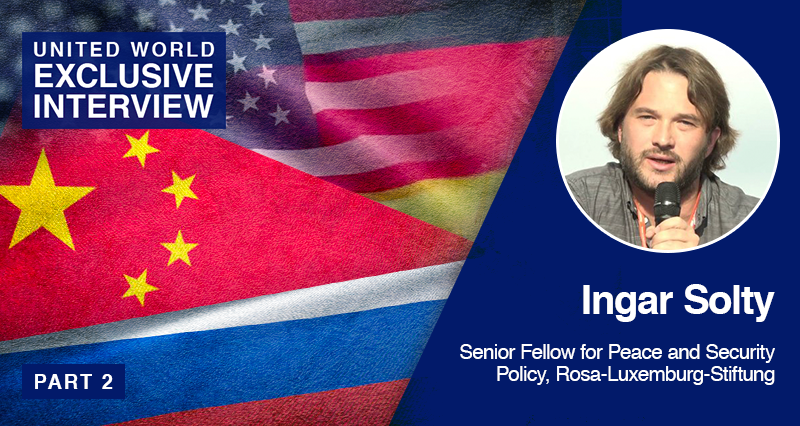We are continuing with the second part of our interview with Ingar Solty, research fellow at the Rosa Luxemburg Foundation affiliated to the Left party and a frequent expert to the German parliament’s public hearings on peace and security policy..
The first part has dealt with the approval of 100 billion Euros of defense spending as extra-budget item, where the parliament was blinded.
Teaching officers of the German Armed Forces, Solty shared his impression that some of them were rejecting the current escalation policy of Germany in the Ukraine crisis.
Solty emphasized that a transition had already been taking place in German policy, which used the current Ukraine crisis as a pretext – just as it did back in 2014 when Russia annexed Crimea.
The second part of the interview focuses on he broader context of global great power competition, Germany’s role in here, the future of transatlantic relations and possible domestic opposition within the country. Solty also makes a proposal on how to avoid escalation and the basis of a future international order.
You mentioned that the US-China conflict is the main background for the change in Germany’s foreign policy. Can you explain that?
Washington’s goal is to integrate China into the American empire, as they did with Europe after World War II. But they lack the advantages and the dominance they had back in 1945. Back then, they had military, financial and economic hegemony. They had occupied the countries, which they integrated into their system. They had military boots on the ground in Germany, Japan and South Korea.
But today, they face a gigantic challenge. The United States is a declining regional power and has understood it needs European support.
Does that mean that Europe needs to take over more jobs in its neighborhood?
Exactly. Specifically in what’s called the ‘ring of fire’: Ukraine, Syria, Mali and so on. Europe is demanded to pursue military interventions against self-created problems through privatization and exploitation.
That needs a special emphasis: The West causes problems by destroying local economies, where people then join ISIS and similar groups. And the Americans want the Europeans to take over the job of military intervention.
How do you place China into that context?
The Chinese challenge for the US is the following: after joining the World Trade Organization, China has converted from the world’s factory into a tech and innovation rival, with all its research and production in the fields of AI, photovoltaic, green energies, high-speed trains, 5G communication and big data.
And China has shown success in competitiveness. After the global economic crisis of 2008, the West has bet on the laying the costs on the lower classes and increasing market share through competition with each other. China on the other hand has pursued a policy of state planning and intervention.
Now the West faces the following choice: Either stopping the rise of China by all military and non-military means, or responding to it with China’s method of state interventionism.
But at the same time, competition among the states of the Transatlantic bloc continues, where the US has also been losing as its trade and payment balances display. Remember that, when fighting against China, then-US President Trump simultaneously spoke of the “very, very bad Germans”.
Now, with the Ukraine crisis, the U.S. got a 4-fold dependent Germany: 1. In terms of energy policy, with lack of gas and oil imports from Russia and instead LNG imports from the U.S.; 2. Diminishing German international competitiveness due to increasing energy prices; and disrupting German-Chinese ties; note here that for Germany, China is a slightly bigger export market than the US. This results in Germany becoming more dependent from the US consumption; 3. Security and military, where block building and increased great power competition benefits Washington as half of the 100 billion Euros goes to the U.S. with the purchase of F-35, transport helicopters and so on; 4. Geopolitical dependency, where Germany in case of conflict will seek US protection. Incidents such as Chancellor Schröder rejecting US-started war in Iraq in 2003 will occur no more.
Bush on US-German relations: ‘leadership in partnership’
After 1990, George Bush Sen. had qualified US-German relations as ‘partnership in leadership’. But the result today is an extremely asymmetrical transatlanticism with Germany becoming a US vassal state.
How is the domestic response to this situation? Are there criticisms against it?
The current German government’s very closely coordinated action in Ukraine is stunning, because it is against the interests of the transnational companies operating from German soil. And they, for instance the Federation of Germany Industry, raises criticism against these policies.
The Federal government currently struggles against increasing energy prices and inflation by setting off the debt limit. But this can only continue a year or so. The U.S. is meanwhile preparing for a long enduring conflict in Ukraine. Hence, there will be more critical voices from the society.
Why does the German government still pursue this policy against dominating interests?
I have some hypotheses about that.
1. War follows a logic and that logic started already in 2014, when Germany sided with the U.S. during the Maidan incidents.
2. The current constellation is very disadvantageous for an autonomous policy, as French President Macron is weakened domestically.
3. The new Chancellor in Germany, Olaf Scholz, is very inexperienced in foreign policy. He was and is being forced or driven by the events, because he left the foreign ministry to hard-core transatlanticists.
At the beginning, Scholz was critical of escalation, he tried to start a peace initiative. But he as pushed by his own partners in the coalition and also the media, which is extremely dominated by transatlanticists.
Actually, it is interesting: The closer the people are to the military and to armed conflict, the more careful or skeptical they are in regards to weapon deliveries. And vice versa: None of the current ministers has served in the armed forces, and some of them send weapons or deploy battalions as if it was a board game.
The media meanwhile is full of uninformed Greens. Some members of media demand for instance the establishment of a no-fly-zone, without having any idea of that this means the readiness to shoot down a Russian jet eventually. Idealism instead of professionalism dominates the media.
The US demands Europe’s disconnection from China
Can the government continue this policy against the dominant interests in the society?
The media had anyhow preferred the coalition of CDU/CSU, the Liberals and the Greens. Scholz was not their favorite. As for the industry, they have a difficult standing, as the CDU/CSU, their main voice, supports the policy. And it is not their style to set up public texts against the government.
There are critical voices regarding the China policy, though. For instance Wolfgang Ischinger, Chairman of the Munich Security Conference says ‘sure we can decouple from China – if we are ready to accept millions of unemployed people’.
I took part as an expert in a hearing of the Federal Parliament’s Foreign Relations Committee. I warned there in my speech of a confrontation with China. Interestingly, all experts invited by the government parties agreed with me.
But their hope is, and that is even the thought of Foreign Minister Baerbock, that the government can together with the US pressure China, without disconnecting the German economy from it. That is the point that makes me laugh.
Truth is that this is exactly what Washington demands: Europe’s disconnection from China!
And what is your proposal for the way ahead?
I plead for a renewed East Policy, with a peace order from Beijing to Lisbon. We need to repair the damage and then pursue confidence-building policy. We need to reject the policy of force and return to international law.
What is needed is peaceful coexistence and cooperation instead of conflict. We also need the rejection of interventions and regime change.
It is truly incredible: Throughout the entire Cold War, no Western politician ever demanded openly regime change in the Soviet Block. And then comes Biden and says, I think in Warsaw, Poland, that Putin can’t be president anymore. There is no more escalating rhetoric than this.
That must stop. Instead, institutions must be introduced to build confidence, and an entirely new framework o tackle challenges like the climate change must be built. Here, the West must also abandon its arrogance of doing everything right.
Different paths of development must be acknowledged. We have liberal democracies. On the other side, there is China that has achieved a great success in fighting poverty, as the United Nations acknowledge. They also achieved success in the climate policy due to a state-led economy.
To save time, we fly from Berlin to Stuttgart, while in China they produce trains that make 650km/h.
And regarding Russia: negotiations are inevitable and the only way. To wage a war against a nuclear power that aims to divide Russia is a pure illusion.

















Leave a Reply